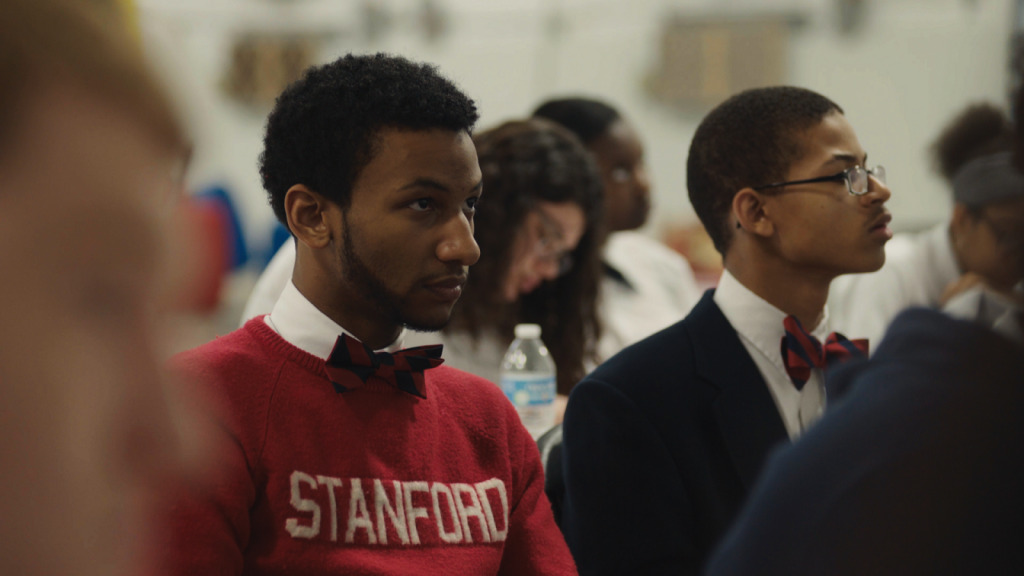
Achieving academic success is not always a simple process. There are societal expectations that are partially based on real-world experiences that having a productive and financially fulfilling career requires attending college, and admission to a higher education institution also brings with it many intense pressures and extracurricular activity. Being accepted into a prestigious university doesn’t necessarily equal a high level of intelligence or perseverance, and the reverse is also true, that those who work extremely hard and excel in every area of their lives may not make the cut. The Tribeca documentary Accepted showcases an innovative, controversial program with remarkable admission rates that hides darker secrets behind its very impressive presentation.
In Louisiana, the TM Landry Prep School employs an approach to learning and college preparedness that is radical, trading textbooks for an entirely new style of teaching. Mike Landry is its passionate leader, radiating energy at his students as he pushes them beyond their limits to ensure that they are as well-suited as possible for entry into the school of their dreams. The fact that the student population includes mostly underprivileged pupils is not nearly as astonishing as what Landry is able to deliver: a perfect college admissions record, for every student.
This documentary begins by celebrating the wonder of this program and the ways in which it has true benefits for those who attend and, in many cases, become the first in their families to even go to college. Viral videos of students finding out that they have been accepted to their first choices are inspiring, and the respect and admiration that they have for Landry conveys how much he has influenced and affected them.

But then, as with anything that seems too good to be true, cracks begin to show. Reports of Landry doctoring transcripts and inventing extracurricular feats are only the beginning. When confronted directly with those accusations and accounts from students that his practices include having them kneel on the ground and other incidents that are more violent and disturbing, Landry refuses to even acknowledge them, swatting away their potential validity by deeming them unworthy of his attention.
There are many stories that have emerged recently of people in a position of power abusing their authority, and most don’t have a happy ending. Those who were taken advantage of in the process certainly suffered, and, if justice is truly served, the perpetrators are held accountable and no longer enabled to repeat their problematic behavior. It’s often a difficult notion to tackle given the positive contributions to society that some argue should outweigh or at least be considered next to what it is they’ve allegedly done wrong.
This film doesn’t outright vilify Landry and his institution, but it does sound an alarm about the methods he uses. Landry doesn’t directly deny any of what has been said about him, and instead repeatedly points to what he has done with his program. He considers the mere fact that he is being challenged and investigated to be an insult, and believes the academic prospects he fosters justify any harsh treatment and questionable action along the way. Based on his attitude, the good that he has done should make him immune from scrutiny, even if there is a very real need to question his motives.
This story is one that supports what many doubters likely suspect: this kind of success cannot be achieved without making sacrifices or compromises along the way that some will find unacceptable. As with the downfall of any person or company, there is collateral damage along the way, like the students who have worked tirelessly and, facing bad press about the school, must transfer midway through their senior years and restart their education, in some cases at a lower level than where they thought they were due to the impossibility of assessing their progress.
Accepted shines a light on an unconventional way of preparing teenagers for academic prosperity, and avoids passing judgment other than to express the need for an up-close evaluation of the true cost of this creativity. This film serves as an important reminder of the dangers of turning idealization into idolization, trusting repeatedly touted achievements but not presuming they come without a price.
Grade: B+
Accepted is screening in the Viewpoints section of the Tribeca Film Festival.

